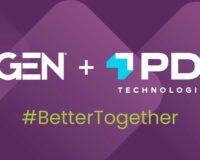
Service Level Agreements
Mobile Commerce Service Level Addendum
The terms set forth in this Mobile Commerce Service Level Addendum are applicable to any Mobile Commerce SaaS provided by PDI pursuant to the Mobile Commerce Addendum.
- Definitions.
- “Downtime” is the number of minutes in a month that the Mobile Commerce SaaS are unavailable to support Customer’s mobile transactions and Customer’s production use of the Mobile Commerce SaaS is stopped or severely impacted and Customer is unable to process mobile payment transactions, or a majority of its sites are hard down. Downtime excludes (i) Downtime and other performance issues caused by the Limitations in Section 2, below, (ii) any Scheduled Downtime, (iii) unavailability not caused by PDI, including circuit or connectivity outages, third-party connection, or system outages (such as payment processors, Customer systems, site systems or Loyalty hosts), and (iii) scheduled maintenance or hotfixes to resolve problems.
- “Scheduled Downtime” means the period in which the Mobile Commerce SaaS are unavailable (measured in hours) due to planned downtime for maintenance, systems repair, or systems upgrades of the Mobile Commerce SaaS. Scheduled Downtime is scheduled during non-peak times unless the downtime is associated with a hotfix associated with emergency repairs.
- “System Response Time” means the total execution time for a representative transaction through the Mobile Commerce SaaS, excluding responses from 3rd party service providers such as payment processors, Customer systems, site systems, and loyalty hosts.
- “Monthly Availability” means 100 X (Minutes in the Month – Downtime) / Minutes in the Month
Example:
100 X (34,560 – 30)/34,560 = 99.91% - “Service Level” means Monthly Availability or System Response Time.
- Limitations. Any applicable Service Levels do not apply to any Downtime, performance or availability issues not caused by PDI, including any such issues:
- Due to factors outside PDI’s reasonable control (for example, natural disaster, war, acts of terrorism, riots, government action, or a network or device failure external to PDI’s data centers, including at Customer’s site or between Customer’s site and PDI’s data center);
- Caused by Customer or any of its Users misuse of the Products;
- That result from the use of services, hardware, or software not provided by PDI, including, but not limited to, issues resulting from inadequate bandwidth or related to third-party software or services;
- Caused by Customer’s continued, unmodified use of the Products after PDI advised Customer to modify Customer’s use of the Products.
- Failures of Customer’s or any of its Users internet connectivity;
- During or with respect to preview, pre-release, beta, or trial versions of a Product, feature, or software;
- That result from the failure to adhere to any required configurations, use supported platforms, follow any policies for acceptable use, or use of the Products in a manner inconsistent with the Documentation for the Product.
- That result from Customer’s failure to follow appropriate security practices; or
- Internet or other network traffic problems (other than problems arising in or from networks contractually provided or controlled by or on behalf of PDI) and excludes including unavailability not caused by PDI, including circuit or connectivity outages, third party connections or system outages (such as payment processors, Customer systems, or 3rd party loyalty hosts).
- Service Level Requirements
- Product Monthly Availability.
- The Products shall meet or exceed a Monthly Availability of at least 99.5%.
- PDI shall use commercially reasonable efforts to minimize any disruption, inaccessibility and/or inoperability of the Products during periods of Scheduled Downtime and Downtime.
- Unscheduled Downtime Notification. PDI shall provide notice and updates to Customer according to the Response and Resolution Guidelines for unscheduled Downtime. Upon resolution of Severity 1 issues, PDI will undergo an investigation to identify the cause and actions required to prevent similar issues in the future. Non-privileged details of this investigation and work undertaken will be provided to Customer.
- System Response Time. The average transaction round trip System Response Time shall be an average of six (6) seconds or less to execute a transaction for not less than 95% of all transactions during each month within PDI’s platform. This excludes calls to 3rd parties such as payment processors, site systems, loyalty hosts, etc.
- Scheduled Downtime
- PDI shall notify Customer of planned Scheduled Downtime as mutually agreed by the parties at least 48 hours in advance except in the event of an emergency hotfix to resolve a critical issue. PDI shall make commercially reasonable efforts to schedule maintenance, systems repairs, and systems upgrades during low utilization periods (typically nights) of the Products.
- The duration of each scheduled Downtime must not exceed 4 hours for complex change, and not exceed 30 minutes for simple change. PDI shall have Scheduled Downtime every 2 weeks for new production releases and every 2 weeks for scheduled maintenance.
- Product Monthly Availability.
- Key Performance Indicators (KPI). All Service Levels and KPIs shall be measured and reported monthly.
| KPI | Description |
| # of Mobile Payment transactions | Measure the number of payment transactions from Mobile App in- each month, and trend analysis |
| Transaction Roundtrip Response Time | Measure Transaction Roundtrip Response Time inside PetroZone Platform services |
| # and % of mobile payment transaction error | Measure the number and percent of errors on Mobile Payment Transactions |
| Scheduled maintenance notification period | To measure the time required for PDI to inform Customer on their scheduled maintenance |
- Support Services
- First Line Support. Customer shall provide commercially reasonable “First Line Support” for the Mobile Commerce SaaS and Customer’s mobile app(s) to all sites and end users (consumers) including problem call receipt, problem call screening, incident reporting and tracking, and resolution of documented problems. First Line Support shall include but not be limited to (a) receipt of all inquiries from and responses to sites and end users (consumers) concerning the performance, functionality or operation of the Mobile Commerce SaaS and Customer’s mobile app(s), (b) receipt of all inquiries from and responses to sites and end users (consumers) with respect to problems or performance deficiencies with the Mobile Commerce SaaS or the Customer’s mobile app(s), and (c) diagnosing reported problems and performance deficiencies of the Mobile Commerce SaaS and Customer’s mobile app(s).
- Second Line Support. If after reasonable commercial efforts, Customer is unable to diagnose or resolve reported problems or performance deficiencies via its First Line Support, Customer shall contact PDI for “Second Line Support” and PDI shall provide Second Line Support for the Mobile Commerce SaaS and Customer’s Branded Standard App in accordance with PDI’s procedures for Second Line Support as described below.
- Second Line Support includes all efforts required to correct the issue with PDI outside the scope of Front-Line Support or when Customer’s Front-Line Support efforts are unable to resolve the problem and may include (a) identifying defective source code and general Mobile Commerce SaaS shortcomings; and (b) providing workarounds or implementing fixes or other software revisions as needed to correct Mobile Commerce SaaS errors. Customer will supply PDI with sufficient information to enable PDI to duplicate or identify the error.
- Second Line Support also includes monitoring and managing the Mobile Commerce SaaS platform and its ecosystems. PDI will perform multiple support services such as:
- Mobile Commerce SaaS and server monitoring, proactively taking steps to keep them up and running
- Network and site connectivity monitoring services
- Security monitoring services
- Hosting services
- Server and database maintenance (database issues, software patches and upgrades)
- Resolving system issues
- Resolving application issues
- Performing bug fixes, and quality assurance
- Third Level Support. Third Level Support is internally provided by PDI to handle diagnosis and resolution of complex problems, which may require in-depth investigation, research, the assistance of specialists and the involvement of any 3rd party vendor for Mobile Commerce SaaS related issues.
- Support Tickets. PDI shall acknowledge all incidents, problems, or requests via return email, or call. PDI shall assign a ticket incident number from PDI’s ticketing system, assign priority level based on criteria defined in the Response and Resolution Guidelines, below, and provide such information to Customer in PDI’s acknowledgment. PDI shall notify Customer when PDI has completed resolution of a support request.
- Response and Resolution Guidelines
| Priority Level | Severity 1 | Severity 2 | Severity 3 |
| Priority Level Definition | Critical business impact. Customer’s production use of the Mobile Commerce SaaS is stopped or severely impacted, and Customer is unable to process mobile payment transactions, or a majority of its sites are hard down. | Significant business impact. Important Mobile Commerce SaaS features (non-payment services) are unavailable with no acceptable workaround. Serious impact on Customer’s productivity and/or service levels. | Some business impacts. Important supported features are unavailable, but a workaround is available, or less significant supported features are unavailable with no reasonable workaround. |
| Initial Response by PDI to Customer | 1 hour | 2 hours | Within 8 hours of normal business hours |
| PDI’s Status Updates to Customer | 30 Minutes | Hourly | Weekly |
| PDI’s Targeted Resolution Time | 4 hours | Maintain engaged until a fix or workaround in place | Next Software Update |






